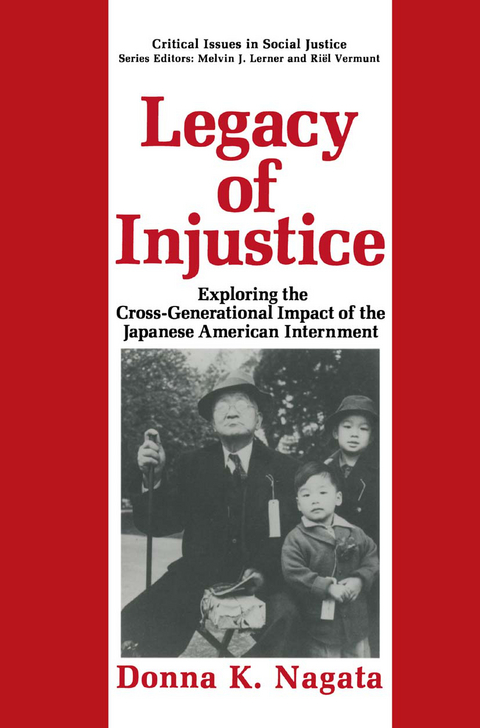
Legacy of Injustice
Exploring the Cross-Generational Impact of the Japanese American Internment
Seiten
2013
|
Softcover reprint of the original 1st ed. 1993
Springer-Verlag New York Inc.
978-1-4899-1120-9 (ISBN)
Springer-Verlag New York Inc.
978-1-4899-1120-9 (ISBN)
As time went by, "camp" remained a vague, cryptic reference to some time in the past, the past of my parents, their friends, my grand parents, and my relatives. It was not until high school that I began to understand the significance of the word, that camp referred to a World War II American concentration camp, not a summer camp.
At the age of 6, I discovered a jar of brightly colored shells under my grandmother's kitchen sink. When I inquired where they had come from, she did not answer. Instead, she told me in broken English, "Ask your mother. " My mother's response to the same question was, "Oh, I made them in camp. " "Was it fun?" I asked enthusiastically. "Not really," she replied. Her answer puzzled me. The shells were beautiful, and camp, as far as I knew, was a fun place where children roasted marshmallows and sang songs around the fire. Yet my mother's reaction did not seem happy. I was perplexed by this brief exchange, but I also sensed I should not ask more questions. As time went by, "camp" remained a vague, cryptic reference to some time in the past, the past of my parents, their friends, my grand parents, and my relatives. We never directly discussed it. It was not until high school that I began to understand the significance of the word, that camp referred to a World War II American concentration camp, not a summer camp. Much later I learned that the silence surrounding discus sions about this traumatic period of my parents' lives was a phenomenon characteristic not only of my family but also of most other Japanese American families after the war.
At the age of 6, I discovered a jar of brightly colored shells under my grandmother's kitchen sink. When I inquired where they had come from, she did not answer. Instead, she told me in broken English, "Ask your mother. " My mother's response to the same question was, "Oh, I made them in camp. " "Was it fun?" I asked enthusiastically. "Not really," she replied. Her answer puzzled me. The shells were beautiful, and camp, as far as I knew, was a fun place where children roasted marshmallows and sang songs around the fire. Yet my mother's reaction did not seem happy. I was perplexed by this brief exchange, but I also sensed I should not ask more questions. As time went by, "camp" remained a vague, cryptic reference to some time in the past, the past of my parents, their friends, my grand parents, and my relatives. We never directly discussed it. It was not until high school that I began to understand the significance of the word, that camp referred to a World War II American concentration camp, not a summer camp. Much later I learned that the silence surrounding discus sions about this traumatic period of my parents' lives was a phenomenon characteristic not only of my family but also of most other Japanese American families after the war.
1. Historical Background.- 2. The Consequences of Injustice.- 3. Using a Cross-Generational Approach.- 4. The Sansei Research Project: Description and Methodology.- 5. Patterns of Communication.- 6. Interest in and Knowledge of the Internment.- 7. Ethnic Preference, Confidence in One’s Rights, and the Possibility of a Future Internment.- 8. Perceptions of Personal and Family Impact.- 9. Perceptions of Suffering and Coping.- 10. Impact on Behaviors.- 11. Redressing Injustice.- 12. Overview and Implications of Findings.- 13. Questions for the Future.- Appendix A: Sansei Research Project Survey.- Appendix B: Sansei Research Project Interview Questions.- Appendix C: Summary of Results by Sansei and Parent Characteristics.- References.
| Reihe/Serie | Critical Issues in Social Justice |
|---|---|
| Zusatzinfo | XX, 278 p. |
| Verlagsort | New York |
| Sprache | englisch |
| Maße | 155 x 235 mm |
| Themenwelt | Geisteswissenschaften ► Archäologie |
| Geisteswissenschaften ► Geschichte ► Allgemeines / Lexika | |
| Geisteswissenschaften ► Psychologie ► Psychoanalyse / Tiefenpsychologie | |
| Sozialwissenschaften ► Soziologie | |
| ISBN-10 | 1-4899-1120-0 / 1489911200 |
| ISBN-13 | 978-1-4899-1120-9 / 9781489911209 |
| Zustand | Neuware |
| Haben Sie eine Frage zum Produkt? |
Mehr entdecken
aus dem Bereich
aus dem Bereich
von der Antike bis in unsere Zeit
Buch | Softcover (2023)
UTB (Verlag)
CHF 41,95


